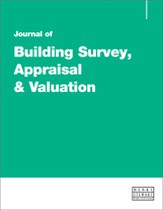The Minimum Energy Efficiency Standards : Energy Performance Certificates, carrying out energy efficiency improvements and the impact on dilapidations
Abstract
The Minimum Energy Efficiency Standards (MEES) set out minimum energy standards for rented property. Those standards are expressed in the form of an Energy Performance Certificate (EPC) rating, so securing a good EPC rating is critical, as poorly performing buildings will become unlettable. It is vital that the EPC truly reflects the building’s construction and services, rather than relying on inaccurate assumptions, which will often return a poorer EPC. Also, the EPC’s Recommendations Report should steer away from an automatically generated list of energy efficiency measures (which may well be completely irrelevant to the building), towards a listing specific to the building and its location. Key to MEES compliance in a building with a poor EPC rating is taking the time to properly assess a number of energy improvement measures to find cost-effective improvements that deliver the required improvement in EPC rating. Careful analysis of various options can reveal that some ‘easy fixes’, such as upgrading lighting or an air-conditioning system, may not deliver enough of an improvement over existing installations, or they may be prohibitively costly, negating any savings overall. Exactly who pays for such energy efficiency improvements is a complex, multifaceted dilapidations question encompassing issues such as repair, statutory compliance, reinstatement/alterations, damages/supersession and loss of rent. Depending on the circumstances, the costs associated with energy improvements are more likely to rest with the landlord — at least currently. The situation is fluid, however, as future leases may well be drafted to include provisions relating to energy efficiency improvements.
The full article is available to subscribers to the journal.
Author's Biography
Nicholas Dowding QC specialises in all aspects of property law, with particular reference to commercial property disputes. Nicholas is the in-house barrister at Hollis and provides external legal and strategic advice to corporate clients on property law matters, including rent reviews, break clauses and dilapidations. Another of his roles is to give internal advice and assistance to the Hollis team in matters on which they are engaged, as well as acting as an arbitrator, independent expert or early neutral evaluator in relation to disputes where neither party is a client of Hollis. Prior to joining Hollis in 2017, Nicholas practised as a member of Falcon Chambers for over 35 years. He is known best for his work in dilapidations, and his co-authored book Dilapidations: The Modern Law and Practice is the leading text on the subject. He is also a co-editor of Woodfall on Landlord and Tenant, the leading textbook on landlord and tenant law, and the current general editor of the Landlord and Tenant Law Reports. In recent years, Nicholas has appeared in the Supreme Court in two leading cases concerning implied terms in break clauses and residential service charges, and in the Court of Appeal and the High Court in cases concerning leasehold enfranchisement, forfeiture, unreasonable withholding of consent, terminal dilapidations, business tenancies and rights of way. He is frequently instructed in large rent review matters and dilapidations claims, in both of which he has expertise, and he is often appointed as an arbitrator or legal assessor.
Stephen Lemmon is a partner at Hollis, heading up the in-house operational engineering team. Stephen joined Hollis in 2007 to establish a mechanical and electrical engineering team and became a partner in 2012. He is head of the London City office as well as managing the team of 35 engineers that provides support to all the company’s offices throughout the UK, Ireland and mainland Europe. Stephen’s expertise is in all areas of building services including heating, air conditioning, domestic hot and cold water, drainage, electrical infrastructure and lighting. He has experience in commercial offices, industrial and residential properties, and acts for both landlords and occupiers. He is also an expert in the identification of services; technical appraisal of defects and system design and performance; assessing whether works amount to improvements; reviewing leases, licences and schedules to understand the configuration of services at lease commencement relating to various landlord and tenant matters. Stephen particularly enjoys being involved in dilapidations, rent review, lease renewal and lease enfranchisement disputes. He has considerable experience in acting as an expert and representing clients at mediation, as well as authoring numerous expert reports and being the engineering expert in hundreds of dilapidations cases. Stephen is proud to have been acknowledged by Nicholas Dowding and Kirk Reynolds for his assistance with the engineering services chapter in the last two editions of their book Dilapidations: The Modern Law and Practice.
Philip White is a partner at Hollis and head of the Cardiff office. He is responsible for the company’s Access Consultancy service and Energy Performance Certificate (EPC) team. Philip is an expert on the Minimum Energy Efficiency Standard (MEES) and regularly writes articles and presents on the subject. He also has experience in access audits, technical due diligence surveys and dilapidations for warehouses, retail, offices (single and multi-let) and a plethora of other more unusual buildings.
Citation
Dowding, Nicholas, Lemmon, Stephen and White, Philip (2019, September 1). The Minimum Energy Efficiency Standards : Energy Performance Certificates, carrying out energy efficiency improvements and the impact on dilapidations. In the Journal of Building Survey, Appraisal & Valuation, Volume 8, Issue 2. https://doi.org/10.69554/YRHN8882.Publications LLP
